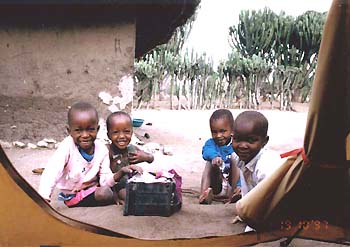
This is a rather old postcard, and dates back to when I conducted the first long-term research in 1997 at the villages in the western Serengeti, Tanzania. During that visit, I spent three months living in a tent. Many people came to take a look inside.
The family who live in the house shown in the photograph gave me a stern warning about staying in a tent. "It's dangerous! The Maasai might come raiding! Give it up!" I boldly rejected their advice, as I needed space where I could become alone. Later on, when a real attack from the Maasai occurred, I was frightened. The "peaceful" village had another side that I was unaware of. During the research in following year, I decided to stay inside of the house, and to sleep with daughters sharing their beds. This turned out to be safer and more comfortable, and it was really pleasant to me chatting with daughters on the beds every night.
When I look at the photograph, I find it symbolizing relationships that exist between me and them.
Researcher and researched; born in an advanced country and born in a developing country; one leaving and one left behind. . .
As long as I am Japanese and a so-called researcher, these relationships divide me and them as an "invisible tent," I suppose.
But then, having lived with the family in their house together, have I constructed relationships that integrate us into an "invisible house," I wonder? I think the answer lies in my way of living from now on.
|
 Postcards from the Field
Postcards from the Field